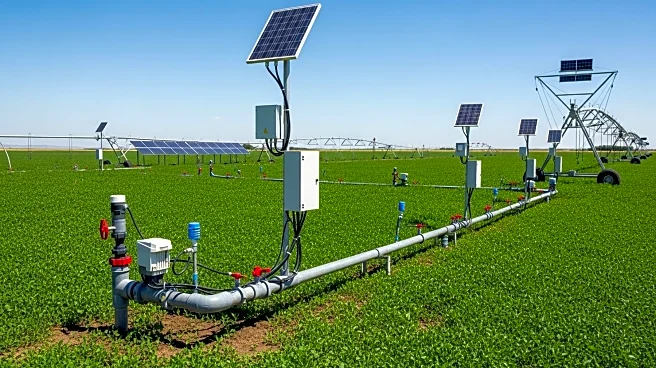What is the story about?
What's Happening?
A recent study published in Agronomy suggests that integrating remote sensing, agro-meteorology, and wireless sensor networks can significantly reduce water usage in agriculture without affecting crop yields. The research focuses on high-value fruit crops like mango, avocado, and vineyards, proposing that smart integration of these technologies can transform irrigation practices. The study reviews evidence from 92 studies, emphasizing the potential of data fusion to achieve sustainability in fruit production amid climate change and water scarcity challenges.
Why It's Important?
The integration of multiple technologies in agriculture is crucial for addressing global water scarcity, a growing concern due to climate change. By improving the accuracy of crop water-demand estimates, this approach can reduce water consumption by up to 30 percent while maintaining yields. This is particularly significant for high-value crops, where water stress can impact both quantity and quality. However, challenges such as calibration, cost, and scalability need to be addressed to make these systems accessible to small and medium-sized producers, ensuring the benefits are not limited to large-scale farms.
What's Next?
The future of smart irrigation may involve artificial intelligence and machine learning to enhance system adaptability. Digital twin models are emerging as tools to simulate and refine irrigation strategies. Developing low-cost Internet of Things platforms and standardized protocols will be essential for making integrated systems accessible to a broader range of farmers. Collaboration among researchers, policymakers, and farmers will be necessary to overcome barriers related to calibration, accessibility, and governance, paving the way for precision irrigation that balances productivity with sustainability.
Beyond the Headlines
The ethical and cultural dimensions of adopting advanced irrigation technologies include ensuring equitable access for all farmers, particularly in developing regions. The long-term shift towards precision agriculture could redefine farming practices, emphasizing sustainability and resource efficiency. Addressing the operational hurdles and cost barriers will be crucial for widespread adoption, potentially transforming agricultural landscapes and contributing to global food security.

















